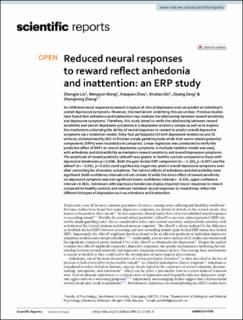| dc.contributor.author | Liu, Zhengjie | |
| dc.contributor.author | Wang, Mengyun | |
| dc.contributor.author | Zhou, Xiaojuan | |
| dc.contributor.author | Qin, Shubao | |
| dc.contributor.author | Zeng, Ziyang | |
| dc.contributor.author | Zhang, Zhongming | |
| dc.date.accessioned | 2023-03-23T12:54:24Z | |
| dc.date.available | 2023-03-23T12:54:24Z | |
| dc.date.created | 2022-11-09T12:59:43Z | |
| dc.date.issued | 2022 | |
| dc.identifier.issn | 2045-2322 | |
| dc.identifier.uri | https://hdl.handle.net/11250/3060148 | |
| dc.description.abstract | An inhibited neural response to reward is typical of clinical depression and can predict an individual's overall depressive symptoms. However, the mechanism underlying this are unclear. Previous studies have found that anhedonia and inattention may mediate the relationship between reward sensitivity and depressive symptoms. Therefore, this study aimed to verify the relationship between reward sensitivity and overall depressive symptoms in a depressive tendency sample as well as to explore the mechanism underlying the ability of neural responses to reward to predict overall depressive symptoms via a mediation model. Sixty-four participants (33 with depressive tendencies and 31 without; dichotomized by BDI-II) finished simple gambling tasks while their event-related potential components (ERPs) were recorded and compared. Linear regression was conducted to verify the predictive effect of ERPs on overall depressive symptoms. A multiple mediator model was used, with anhedonia and distractibility as mediators reward sensitivity and overall depressive symptoms. The amplitude of reward positivity (ΔRewP) was greater in healthy controls compared to those with depressive tendencies (p = 0.006). Both the gain-locked ERP component (b = − 1.183, p = 0.007) and the ΔRewP (b = − 0.991, p = 0.024) could significantly negatively predict overall depressive symptoms even after controlling for all anxiety symptoms. The indirect effects of anhedonia and distractibility were significant (both confidence intervals did not contain 0) while the direct effect of reward sensitivity on depressive symptom was not significant (lower confidence interval = − 0.320, upper confidence interval = 0.065). Individuals with depressive tendencies display impaired neural responses to reward compared to healthy controls and reduced individual neural responses to reward may reflect the different biotypes of depression such as anhedonia and inattention. | en_US |
| dc.language.iso | eng | en_US |
| dc.publisher | Nature | en_US |
| dc.rights | Navngivelse 4.0 Internasjonal | * |
| dc.rights.uri | http://creativecommons.org/licenses/by/4.0/deed.no | * |
| dc.title | Reduced neural responses to reward reflect anhedonia and inattention: an ERP study | en_US |
| dc.type | Journal article | en_US |
| dc.type | Peer reviewed | en_US |
| dc.description.version | publishedVersion | en_US |
| dc.rights.holder | Copyright 2022 The Author(s) | en_US |
| dc.source.articlenumber | 17432 | en_US |
| cristin.ispublished | true | |
| cristin.fulltext | original | |
| cristin.qualitycode | 1 | |
| dc.identifier.doi | 10.1038/s41598-022-21591-9 | |
| dc.identifier.cristin | 2071221 | |
| dc.source.journal | Scientific Reports | en_US |
| dc.identifier.citation | Scientific Reports. 2022, 12, 17432. | en_US |
| dc.source.volume | 12 | en_US |
| dc.source.issue | 1 | en_US |

